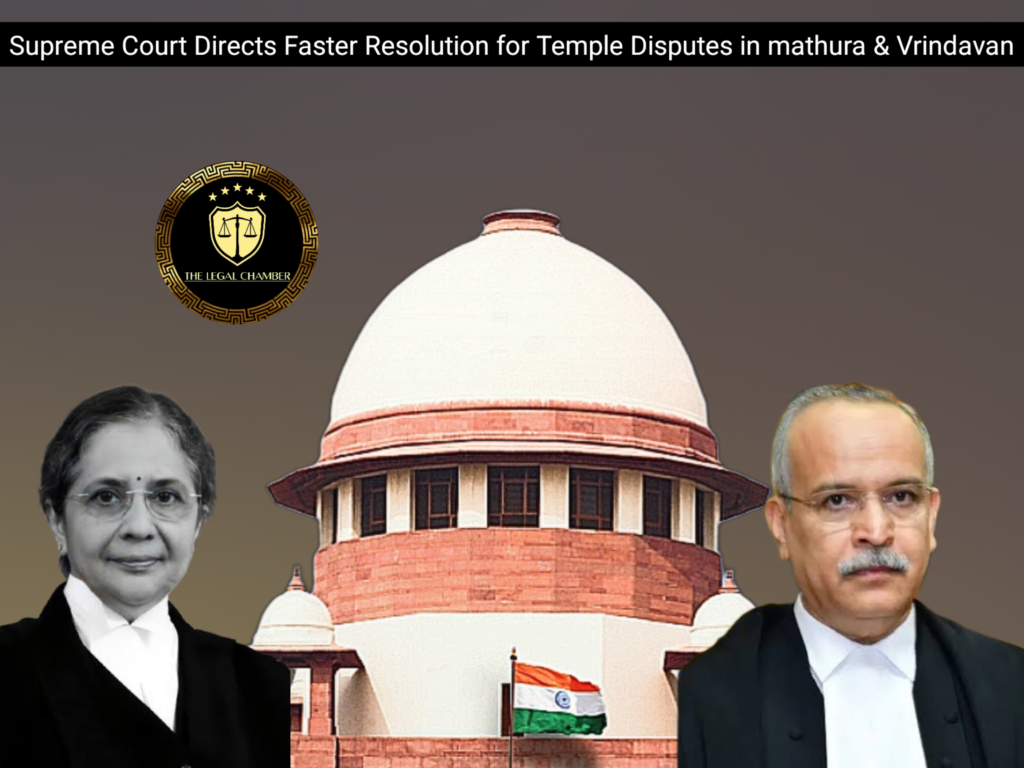
The Supreme Court ruled on the appointment of temple receivers under Order XL Rule 1 CPC, emphasizing that advocates should not routinely manage religious institutions due to potential conflicts of interest. It directed courts to appoint administrators with religious and administrative expertise while prioritizing expedited dispute resolution. The Court also permitted the state to utilize temple funds for land acquisition under strict conditions, ensuring ownership remains with the deity/trust. The judgment reinforces judicial restraint in prolonged receiverships and aligns with Article 25(2) of the Constitution, allowing state intervention for public order and pilgrim welfare.
Facts Of The Case:
The case arose from a dispute over the management of Sri Giriraj Temple, Govardhan, Mathura, administered by the Sri Giriraj Sewak Samiti, a registered society. The conflict began in 1999 with rival elections, leading to a civil suit (Original Suit No. 332/1999) seeking a permanent injunction against interference in temple affairs. The Prescribed Authority upheld one election in 2000, but litigation continued. Over 25 years, the suit remained unresolved, with multiple interim orders appointing advocates as receivers to manage the temple.
In 2023, the Trial Court appointed a seven-member receiver committee, including three lawyers, which was challenged in a contempt petition before the Allahabad High Court. The High Court (Impugned Order, 27.08.2024) set aside the committee, ruling that Order XL Rule 1 CPC does not permit routine appointment of advocates as receivers, as it prolongs litigation and mismanagement. The Court directed the appointment of persons with religious and administrative expertise instead.
The Supreme Court upheld the High Court’s decision, emphasizing that temple management must be freed from prolonged legal control. It also addressed broader issues, permitting the State of Uttar Pradesh to use temple funds for land acquisition (under strict safeguards) to improve pilgrim safety, particularly for Shri Banke Bihari Temple, where a 2022 stampede had occurred. The judgment stressed expeditious resolution of temple disputes and judicial restraint in appointing receivers.
Procedural History:
The procedural history of this case traces a protracted legal battle spanning over two decades. The dispute originated in 1999 with competing claims over temple management elections, leading to Original Suit No. 332/1999 before the Civil Judge (Senior Division), Mathura. In 2000, the Prescribed Authority under the Societies Registration Act validated one election, but litigation continued. The Allahabad High Court dismissed a related writ petition in 2006, declaring it infructuous. Over the years, multiple interim orders appointed advocates as receivers, including a seven-member committee in 2023.
The High Court, in its 2024 contempt ruling, set aside the committee, finding it violated Order XL Rule 1 CPC by perpetuating litigation. The matter reached the Supreme Court via Special Leave Petition (C) No. 29702/2024, where the State of Uttar Pradesh and other stakeholders intervened. The Supreme Court upheld the High Court’s decision, reinforcing limits on receiver appointments and addressing broader temple administration issues. The case also linked to a parallel PIL (No. 1509/2022) concerning the Banke Bihari Temple stampede, where the Court modified the High Court’s order to allow temple funds for land acquisition. The judgment culminated in directives for expedited resolution and reform in temple governance.
READ ALSO : Supreme Court Eases Custody Rules for NRI Father
Court Observation:
The Supreme Court made several critical observations in its judgment. It emphasized that the routine appointment of advocates as receivers under Order XL Rule 1 CPC was improper, noting that such appointments often prolong litigation and create conflicts of interest. The Court stressed that temple management requires administrative competence and religious knowledge, not just legal expertise.
The bench expressed concern over decades-long disputes paralyzing temple administration, observing that 25 years of litigation with no resolution was unacceptable. It directed courts to prioritize speedy disposal of such cases and avoid unnecessary interim arrangements. The judgment also highlighted the State’s role in ensuring pilgrim safety under Article 25(2), permitting the use of temple funds for infrastructure—but with safeguards to protect the deity’s ownership rights.
Additionally, the Court condemned the “receiver culture” in Mathura’s temples, where court-appointed managers indefinitely control shrines. It urged the appointment of independent, qualified administrators with ties to religious traditions, particularly from the Vaishnava Sampradaya, to restore proper governance. The ruling balanced judicial oversight with respect for religious autonomy, setting a precedent for temple dispute resolution nationwide.
Final Decision & Judgement:
The Supreme Court upheld the Allahabad High Court’s decision, ruling that the appointment of advocates as temple receivers under Order XL Rule 1 CPC was improper and contributed to unnecessary delays in resolving temple disputes. The Court directed the Civil Judge (Senior Division), Mathura, to appoint a qualified receiver with administrative competence and religious knowledge, preferably from the Vaishnava Sampradaya, to ensure proper temple governance.
Additionally, the Court modified the Allahabad High Court’s order in the Banke Bihari Temple PIL (No. 1509/2022), permitting the State of Uttar Pradesh to utilize temple funds for acquiring land to improve pilgrim safety, provided the land remains in the deity’s name. The judgment emphasized expeditious resolution of pending temple disputes and discouraged prolonged court-appointed receiverships. The ruling reinforced judicial restraint in temple administration while balancing religious autonomy with public welfare under Article 25(2) of the Constitution. The appeal and all pending applications were disposed of with no order as to costs.
Case Details:
Case Title:Ishwar Chanda Sharma vs. Devendra Kumar Sharma & Ors. Citation:(2025) INSC 700 Appeal No.:Arising out of SLP (C) No. 29702 of 2024 Date of Judgment:May 15, 2025 Bench: Justice Bela M. Trivedi & Justice Satish Chandra Sharma
Download The Judgement Here